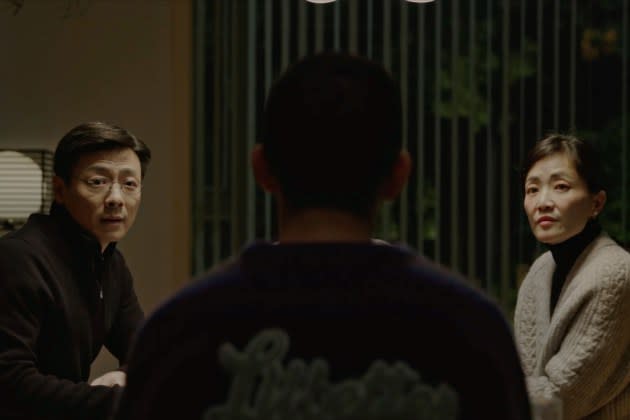‘Brief History of a Family’ Review: Suspenseful Chinese Drama Puts a Twist on the Family Infiltrator Plot

Elevated by its consistent visual inventiveness, Chinese writer-director Jianjie Lin’s suspenseful drama “Brief History of a Family” could appear, at first glance, as a clear-cut case of a cunning infiltrator wreaking havoc in an unsuspecting household. Yet the closer we observe, the more it reveals itself as a tale of wish fulfillment for everyone involved. No doubt comparisons to “Saltburn,” “The Killing of a Sacred Deer” or “The Talented Mr. Ripley” will abound, but what Lin conceived is far more subcutaneous, with a sobering tone and disinterested in building up to a grand plot twist — though the resolution is unexpected.
Hit with a basketball while doing pull-ups, 15-year-old Yan Shuo (Xilun Sun) injures his leg. As an apologetic gesture, the guilty culprit, Tu Wei, a fellow classmate from an affluent family, invites Shuo to play video games and to stay over for dinner. Mr. and Mrs. Tu react, impressed at Shuo’s reserved demeanor and his drive to excel in his studies, a quality their privileged son, whose sole focus is fencing, lacks. Shuo shares that his mother died giving birth and his alcoholic father physically abuses him. Visible bruises corroborate his claim, immediately earning the parents’ sympathy. Their trust isn’t difficult to earn. Shuo simply shows interest in Mrs. Tu’s stories about her trips and in Mr. Tu’s love of classical music.
More from Variety
Lin anticipates that audiences’ first instinct may be to doubt the sincerity of Shuo’s actions, to assume that he has orchestrated everything to play a victim and benefit from the sources the Tu clan can offer. But besides gaining the adults’ favor, there are no overt signs that Shuo wants to deliberately push Wei out of the picture or cause him harm to replace him. That may be the brilliance of his whole act. But it doesn’t stop the family’s actual son from feeling left out. The mystery of his intent hinges on how Xilun plays Shuo: an impenetrable fortress, difficult to read, chillingly collected even when under distress, and perpetually observant.
Shuu’s avid attention to details about his hosts, who essentially adopt him, is reflected in how certain shots exist in a perfect circular frame, to imply that the Tu family is being analyzed as if under a microscope. Mr. Tu works for a medical equipment company. In this thoroughly elegant and subdued film, Mr. Tu’s mention of an enzyme that penetrates a cell — an evident illustration of how Shuo gained access to their home — may seem like the most inelegant note, until late in the story the one using pity to gain sympathy is someone else.
Numerous other instances of thematically relevant imagery populate the film, such as the way DP Jiahao Zhang captures the sleek and gray clinical symmetry of modern buildings, a symbol of progress and stability that Shuo want to belong to. There’s a literal duel between the two teenage boys using umbrellas as weapons, as well as a less explicitly violent combat that takes place inside the bedroom the two kids eventually share. Shuo is reading, but Wei wants to sleep and turns off the light. On and off goes the light switch on several locations with the screen going from complete darkness to reveal a more aggressive standoff with each time.
But the Tu couple hasn’t felt this connected in a long time. They interpret Shuo’s arrival as an opportunity for a new beginning. There’s no longer a need for them to mold Wei into a model student with aspirations of attending an Ivy League school in the U.S. now that the ideal child has walked in the door. But is that sentiment fair to Wei, their biological son they cannot accept for who he is? When tragedy strikes Shuo, Wei clumsily consoles his friend turned putative brother suggesting that now his dream of freedom has come true. In turn, Wei’s juvenile dream is to get his parents off his case, and for them to let him pursue his passion for fencing. However, will Wei be happy when his wish too comes to pass?
Unlike other films centered around a young man penetrating a family’s home with ulterior motives, “Brief History of a Family” maintains that the blame for the intrusion doesn’t lie solely on the perpetrator’s thirst for upward mobility or revenge. Shuo is only allowed to become so intricately attached to their lives because they allow him to. There was no threat hanging over them. For a while the relationship was mutually beneficial. And that lingering feeling that the roles of the one taking advantage and the one being used could be easily redrawn within the walls of the stylish home is what turns Lin’s debut into engrossing brain-tickler.
Best of Variety
Sign up for Variety’s Newsletter. For the latest news, follow us on Facebook, Twitter, and Instagram.
